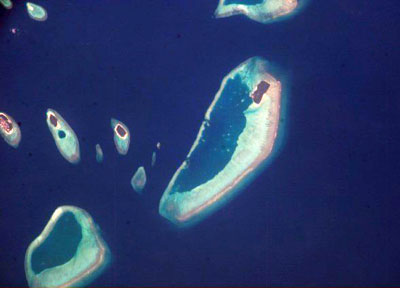
|
The
Maldives--a string of more than 1000 small islands that stretch from the
southern tip of India to the equator--may be underwater within the next century,
according to a new study. The finding is the latest salvo in a raging debate
over whether changes in global sea level will cause the islands to disappear.
 |
Sink or swim? The Maldives may disappear under the sea within the next century.
CREDIT: Science and Analysis Laboratory/NASA-Johnson Space Center |
In
2001, the Intergovernmental Panel on Climate Change (IPCC) predicted a global
sea level rise between 9 and 85 centimeters by 2100. The prediction, based
on computer modeling of published studies, blames warming of the planet's
oceans (ScienceNOW,
22 January, 2001). Under this scenario, islands such as the Maldives, most
of whose land is less than 1 meter above sea level, are destined to disappear.
But not everyone agrees with the dire predictions. Geologist
Nils-Axel M�rner of Stockholm University in Sweden argues that IPCC computer
models are wrong. In addition, his own fieldwork, published last year, indicates
that increased evaporation of the Indian Ocean caused by global warming has
actually caused the sea level there to fall 30 centimeters in the past few decades.
Now, oceanographer Philip Woodworth of the Proudman Oceanographic
Laboratory, U.K., challenges M�rner's claims by asserting that a sea level
fall is implausible from meteorological and oceanographic perspectives. Woodworth,
who reports his study in an upcoming issue of Global and Planetary Change,
examined a set of climatic and oceanographic historical records from the
Maldives and their vicinity. He studied air and sea surface temperature,
wind speed, rainfall trends, and land movements that could lead to sea level
drop. Woodworth couldn't find any evidence to support the proposed sea level
fall posited by M�rner and concludes that the IPCC's prediction remains the
most reliable scenario for the future of the Maldives.
"It's an excellent case study that brings together an impressive array of
information," says oceanographer Mark Merrifield of the University of Hawaii
in Honolulu. For his part, M�rner maintains that the true fate of the Maldives
should be deduced from direct observation and not just from models or historical
records. "Our field observations remain fresh and clear," he says. "Others
just want to repeat the same old flooding story."
--JACOPO PASOTTI
Related site
More on the Maldives
|

![]() Copyright � 2005 by the American Association for the Advancement of Science.
Copyright � 2005 by the American Association for the Advancement of Science.